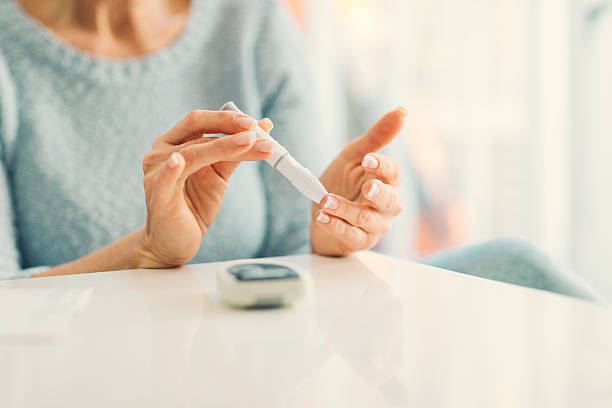It’s Diabetes Week in the UK and, this year, the focus is all on celebrating individuals who are living with the condition.
 Established by Diabetes UK and running from 12th to 18th June, the annual nationwide initiative is designed to raise awareness of diabetes while also raising money to fund research into the condition, which is estimated to affect over 5 million people in the UK.
Established by Diabetes UK and running from 12th to 18th June, the annual nationwide initiative is designed to raise awareness of diabetes while also raising money to fund research into the condition, which is estimated to affect over 5 million people in the UK.
Diabetes Week will be marked by community events and activities, challenges, races, walks and much more around the theme of celebrating the unique individuals behind each diabetes diagnosis.
Diabetes UK explains:
“[…] Diabetes can feel like a never-ending stream of numbers. And some days, they just don’t add up.
“Diabetes doesn’t stop, but neither do you. You juggle the ups and downs, you face diabetes head on every morning (whatever your blood sugar) and you don’t let it hold you back.
“So, this Diabetes Week, we want to celebrate everything that makes you, you. Because you’re so much more than just your numbers.”
Get involved with Diabetes Week
People can get involved in Diabetes Week by accessing fundraising packs and information, resources, including posters and bunting, and products such as t-shirts, bandanas and nail varnish, from Diabetes UK’s website.
 The charity is also urging people to take part in their One Million Step Challenge, supported by Fitbit.
The charity is also urging people to take part in their One Million Step Challenge, supported by Fitbit.
The potentially life-changing challenge encourages participants to achieve around 10,000 steps per day for three months during the summer. This may help people improve their health and fitness, and possibly lose weight. Participants can also ask friends, family and colleagues to sponsor them during the challenge to help them raise much-needed funds for diabetes research and treatment, which can be truly life-changing for those living with the condition.
Participants in the One Million Step Challenge can earn rewards and access helpful resources to boost their fundraising efforts.
In keeping with the celebratory theme for Diabetes Week, Diabetes UK is also sharing individual’s inspiring stories. These stories include numerous tales of how the latest diabetes technology has changed people’s lives.
Equitable access to diabetes tech
It comes as Diabetes UK is campaigning for fair and equal access to diabetes tech to help and support all those with a diagnosis.
The charity has just launched their Diabetes Tech Can’t Wait campaign in England, after already launching the initiative in Scotland back in March.
 Wearable diabetes technology includes flash glucose monitoring, continuous glucose monitoring (CGM), insulin pumps and hybrid closed loops. It can be life-changing for individuals living with diabetes, allowing them to effectively and easily keep track of their blood sugar levels and regain a sense of control in their daily lives, while also improving long-term health outcomes.
Wearable diabetes technology includes flash glucose monitoring, continuous glucose monitoring (CGM), insulin pumps and hybrid closed loops. It can be life-changing for individuals living with diabetes, allowing them to effectively and easily keep track of their blood sugar levels and regain a sense of control in their daily lives, while also improving long-term health outcomes.
Both flash and continuous glucose monitoring (CGM) have been shown to be clinically and cost-effective by the National Institute for Health and Care Excellence (NICE). They published guidance in March 2022 which recommends people of all ages with Type 1 diabetes and some people with Type 2 diabetes should be offered a choice of monitoring devices.
However, Diabetes UK reveals that, currently, access to the tech can be a postcode lottery. They explain that some Integrated Care Boards (ICBs) have introduced policies to extend access to Flash and CGM following NICE’s recommendations, while others are yet to implement them fully.
The charity says that access to this life-changing technology “must be based on your need, not on your postcode.”
Their Head of Policy, Campaigns and Mobilisation, Helen Kirrane, says:
“We want to make sure everyone eligible gets the right device for them and that it becomes a standard part of their diabetes care. Doing so could improve the quality of life for many and ease financial and capacity pressures on the NHS by improving clinical outcomes and make remote consultations easier.”
NICE are also expected to make further announcements soon regarding who should be eligible for hybrid closed loops technology.
 Meanwhile, Diabetes UK is currently supporting a National Diabetes Audit Quality Improvement Collaborative project, working with 83 specialist diabetes teams across England and Wales to improve access to insulin pumps in line with NICE guidance.
Meanwhile, Diabetes UK is currently supporting a National Diabetes Audit Quality Improvement Collaborative project, working with 83 specialist diabetes teams across England and Wales to improve access to insulin pumps in line with NICE guidance.
Access to all types of diabetes technology, including smart connected pens, is vitally important, but Diabetes UK says the current guidelines for Flash and CGM mean that better access to these options should be extended across the country.
The charity acknowledges that healthcare services are under tremendous pressure, and says it is backing calls for a fully funded NHS workforce strategy to help combat this. They want a “greater political focus and resource to address the backlog of missed diabetes checks and appointments.”
They are also using their campaign to develop a better insight into the barriers faced by healthcare professionals when it comes to making diabetes technology more widely available for eligible patients, and wants to work with the NHS to help resolve these.
Over 5 million people impacted by Diabetes Week
The transformative power of diabetes tech is incredibly significant for individual patients and the health service, since over 5 million people are currently living with diabetes in the UK, and common serious complications arising from the condition include amputations, strokes, heart attacks and heart failure.
In April this year, Diabetes UK revealed new figures that show that 4.3 million people in the UK have received a formal diagnosis of diabetes.
In addition, it is estimated that as many as 850,000 more people are living with undiagnosed diabetes, and more than 2.4 million people are at high risk of developing type 2 diabetes.
Around 90% of diagnoses relate to type 2 diabetes, while type 1 accounts for 8% of diagnoses, and other forms of the condition make up the remaining 2%.
Awareness and training
 First Response Training (FRT) is a leading, national training provider. They deliver over 7,000 courses each year in the fields of health and safety, first aid, fire safety, food safety, mental health, health and social care and other special focus topics.
First Response Training (FRT) is a leading, national training provider. They deliver over 7,000 courses each year in the fields of health and safety, first aid, fire safety, food safety, mental health, health and social care and other special focus topics.
Their diverse course portfolio includes the Level 2 Award in Diabetes Awareness. They also provide special practical training in key delegated healthcare tasks, including Insulin Administration.
A Trainer at FRT, says:
“Diabetes is a serious condition which affects millions of people every day for the rest of their lives, and can lead to even more serious health emergencies.
“It’s important that people living with diabetes are provided with effective, proven support to help them manage the condition effectively and improve their daily lives and future health outcomes. We therefore support Diabetes UK’s campaign for fair and equal access to diabetes tech for all those who are eligible.
“It’s also vital that anyone working with and supporting individuals with a diabetes diagnosis is aware of the complications that can arise from the condition and is able to spot instances of hypoglycaemia and hyperglycaemia and knows when to seek urgent medical attention.
“We can provide essential training to help workers in the health and social care sector gain a better understanding of diabetes and, where relevant, we can also train care workers to administer insulin.”
Key signs and symptoms of diabetes include ‘the four Ts’:
- Thirsty – feeling very thirsty
- Tired – feeling more tired than usual
- Toilet – needing to go for a wee frequently, particularly during the night
- Thinner – losing weight without meaning to
Additional symptoms may include:
- Cuts or wounds that are slow to heal
- Blurred vision
- Itchiness around the genital area or regular bouts of thrush
For more information on the training provided by FRT, please call them on freephone 0800 310 2300 or send an e-mail to info@firstresponsetraining.com.
